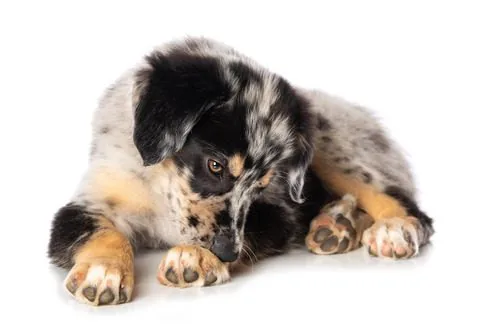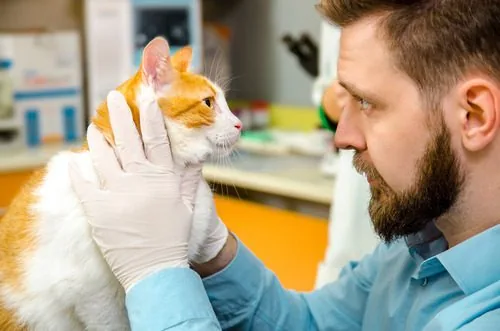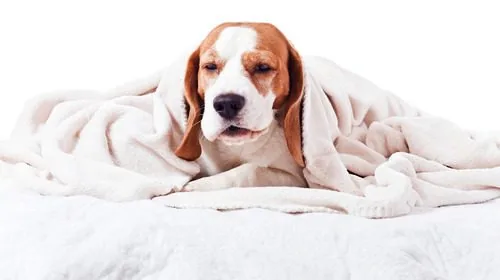Dog Licking Paws Excessively
Paw licking might seem like a harmless habit, but when it starts happening all the time, it can signal something more serious. Many dogs lick their paws to soothe irritation, pain, or anxiety, but excessive licking can quickly lead to raw skin, infections, and ongoing discomfort. It’s one of the most common concerns pet owners bring up during vet visits, and for good reason. In this blog, we’re breaking down the potential causes of this behavior, what it could mean for your dog’s health, and why it’s important to have your veterinarian take a closer look. Keep reading to learn what’s behind the licking and how to take the next step toward helping your dog feel more at ease.

Why Is My Dog Licking Their Paws Excessively?
When a dog starts licking their paws excessively, they’re trying to communicate discomfort. Dogs often use licking as a way to self-soothe, but frequent licking, especially if it’s focused on one area, typically signals something more than a habit. It could be triggered by something as simple as a minor irritation or as complex as an underlying medical condition. Licking can result in red, inflamed skin or even infections if the behavior continues for too long.
If your dog’s paws appear raw, swollen, or discolored, it’s time to consult your veterinarian. Excessive licking is not normal and often causes more damage over time. Your veterinarian will be able to assess your dog’s symptoms and determine whether the root cause is medical or behavioral. If you live in the Plymouth Meeting, PA area, The Village Vets – Plymouth Meeting is happy to help. Give us a call at (484) 820-1700 or schedule an appointment online so we can get to the bottom of the issue and help your dog find relief.
Potential Reasons Why Your Dog Can’t Stop Licking Their Paws
Dogs lick their paws for many reasons, and figuring out why it’s happening involves looking at their behavior, environment, and health history. Below are the most frequent causes we see at our clinic.
Environmental Allergies
Seasonal or environmental allergies are among the most common reasons dogs lick their paws excessively. Pollen, mold, dust mites, and even lawn treatments can trigger allergic reactions in dogs. When allergens come into contact with your dog’s skin, particularly the sensitive skin between their paw pads, they may respond by licking to relieve the itchiness. If you notice your dog licking their paws during certain times of the year or after walks, allergies might be the cause. Look for other signs like sneezing, red eyes, or ear infections, which often accompany allergic reactions.
Food Allergies
When a dog reacts to a specific protein or ingredient in their diet, they may develop skin inflammation that leads to chronic itching. Paw licking is often one of the first signs. If you suspect a food allergy, your veterinarian might recommend an elimination diet to identify the source. It’s important not to switch foods frequently without guidance, as that can make it harder to pinpoint the problem.
Fleas or Parasites
Flea bites can lead to itching and irritation, especially for dogs with flea allergy dermatitis. If fleas are present, dogs may lick or chew their paws to relieve the discomfort. Mites and other parasites can also trigger this behavior. Even if you don’t see fleas, it doesn’t mean they aren’t there. Flea dirt (small black specks on the skin) and unexplained scratching are good reasons to contact your vet for a closer look.
Pain or Injury
Dogs may lick their paws excessively if they’re in pain. This could be due to a foreign object (like a thorn or splinter), a cut, or even arthritis in older dogs. Licking serves as a coping mechanism for discomfort, and many dogs will lick the area that hurts. If your dog suddenly starts licking one paw more than the others, check for visible injuries, but also have them evaluated by your veterinarian. Internal pain isn’t always obvious.
Behavioral Reasons for Paw Licking
Not all cases of excessive paw licking are medical. Dogs may develop compulsive licking behaviors in response to stress, boredom, or anxiety. When left untreated, this can become a chronic habit that leads to skin damage.
Stress and Anxiety
Dogs under stress may redirect their anxiety into repetitive behaviors like paw licking. Changes in the household, separation anxiety, or loud noises can all cause this response. Licking helps some dogs self-soothe in the same way that pacing or whining might. You might notice this behavior happens more often when your dog is alone or during specific triggers (e.g., thunderstorms or car rides). If this seems to match your dog’s behavior, your vet may discuss ways to manage anxiety.
Boredom and Lack of Enrichment
Dogs need mental and physical stimulation. Without it, they may turn to behaviors like excessive paw licking to pass the time. This is especially common in dogs that are home alone for long periods or those that don’t receive regular exercise. If your dog is healthy and has no medical issues, a lack of enrichment could be the cause. Look into puzzle toys, longer walks, or other ways to provide structured activity during the day.
When to Call the Vet for Paw Licking
While the occasional paw lick is normal, consistent or obsessive licking should be addressed by your veterinarian. Here are signs that it’s time to schedule an appointment:
- Your dog licks the same paw repeatedly
- You see redness, swelling, or sores
- Your dog limps or avoids putting weight on a paw
- The behavior started suddenly and doesn’t improve
- You’ve noticed changes in your dog’s appetite, energy, or mood
Persistent licking can cause infections or delay healing if left untreated. Early intervention allows your vet to identify and manage the cause before the condition worsens. Residents of Plymouth Meeting can trust the team at The Village Vets – Plymouth Meeting for thorough, compassionate care. We’ll work with you to understand what’s driving your dog’s behavior and offer solutions to improve their comfort. Call (484) 820-1700 or book an appointment online.
The Impact of Excessive Paw Licking on Your Dog’s Health
Chronic paw licking can lead to secondary problems that affect your dog’s comfort and quality of life. Constant moisture from saliva can break down the skin barrier, leading to irritation, infection, and even hair loss. Dogs that continue to lick may create painful hotspots or develop fungal or bacterial infections that require treatment.
In some cases, dogs develop acral lick dermatitis, a condition caused by repetitive licking of a single area. This can lead to open sores that take time to heal and often require long-term care. Even if the underlying cause of the licking is behavioral, the physical effects can still be serious. Addressing excessive licking promptly is the best way to protect your dog’s skin and overall comfort. If you’re seeing signs of damage or infection, schedule a visit with your veterinarian.
What to Expect During Your Dog’s Veterinary Visit
When you bring your dog in for excessive paw licking, your veterinarian will start with a detailed physical exam. They’ll look closely at the paws and skin, ask questions about your dog’s behavior, and possibly recommend tests to identify any underlying medical conditions.
Diagnostic Steps May Include:
- Skin scrapings to check for mites or other parasites
- Allergy testing or elimination diets
- X-rays to evaluate for joint pain or injury
- Fungal or bacterial cultures
- A review of your dog’s history and daily routine
With the right diagnosis, your vet can create a tailored treatment plan. This might involve addressing allergies, managing pain, or suggesting enrichment and training tools if the cause is behavioral. Treatment will always be based on your dog’s individual needs.
Helping Your Dog Feel Better Starts with a Call
If your dog is licking their paws excessively, don’t wait to see if it gets better on its own. This behavior usually points to an underlying problem that needs attention. Left unchecked, it can lead to infection and long-term discomfort. The Village Vets – Plymouth Meeting is here to help you figure out what’s going on and offer solutions that work for your dog. Call us at (484) 820-1700 or schedule your appointment online today. Your dog deserves to feel comfortable, and we’re ready to support you every step of the way.
Recent Posts
About The Village Vets
The Village Vets of Plymouth Meeting offers excellent service to clients in a comfortable, friendly atmosphere. To learn more about us and how we can better serve you and your pet here in Plymouth Meeting, PA, click the button below.
Share This Post
Recent Posts
About The Village Vets
The Village Vets is a network of three animal hospitals based in Atlanta, GA and the surrounding area. We offer honest, excellent service to our clients in a comfortable, friendly atmosphere. To learn more about our locations and how we can better serve you and your pet, click the button below.




